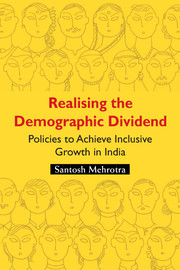Book contents
- Frontmatter
- Contents
- List of Tables and Figures
- Preface
- Acknowledgements
- Part 1 Growth, Employment and Inclusion
- Part 2 Human Capital Formation
- Part 3 Building a System of Social Protection
- Chapter 12 Minimising Leakages in Welfare Programmes: How to Identify the Poor Correctly?
- Chapter 13 Needed a Social Insurance System for Unorganised Workers below the Poverty Line
- Chapter 14 Introducing Cash Transfers: A Proposal for a Minimum Income Guarantee and Some CCTs
- Part 4 Governance
- Index
Chapter 14 - Introducing Cash Transfers: A Proposal for a Minimum Income Guarantee and Some CCTs
from Part 3 - Building a System of Social Protection
Published online by Cambridge University Press: 05 June 2016
- Frontmatter
- Contents
- List of Tables and Figures
- Preface
- Acknowledgements
- Part 1 Growth, Employment and Inclusion
- Part 2 Human Capital Formation
- Part 3 Building a System of Social Protection
- Chapter 12 Minimising Leakages in Welfare Programmes: How to Identify the Poor Correctly?
- Chapter 13 Needed a Social Insurance System for Unorganised Workers below the Poverty Line
- Chapter 14 Introducing Cash Transfers: A Proposal for a Minimum Income Guarantee and Some CCTs
- Part 4 Governance
- Index
Summary
Introduction
There has been a growing chorus of opinion in India that redistributive programmes of the government have been relatively ineffective, that the benefits do not reach the poor, and that there is a case for introducing forms of social assistance that have so far not been tried extensively (Kapur and Mukhopadhyaya, 2007; Prahalad et al., 2009; Ministry of Finance, 2009; Nilekani Committee Report, 2011). The case has been made that like other emerging market economies India too should seriously consider this form of social assistance. Latin American countries were the first to introduce conditional cash transfers (CCTs), and in recent years, a few Asian countries have also been doing so (for example, Indonesia, the Philippines).
This chapter makes the case for an unconditional cash transfer, which would guarantee a minimum income to the poor (as determined by the Tendulkar poverty line). It also makes the case for six other CCTs that should be considered for introduction by the central government. However, it cautions that there are pre-requisites for introducing CCTs that are not yet present fully in the Indian governance system, though they are in the process of being put in place. Hence, a hurried introduction of cash transfers, conditional or unconditional, would be fraught with risks, and vulnerable to implementation problems as serious as those that beset the prevailing delivery system for redistributive programmes. It also argues that financing for the CCTs is not difficult, and it shows clearly where the finance can be found – by converting existing subsidies or programme funding into CCTs.
It is useful to clarify that the Direct Benefits Transfers (DBT) that the Government of India announced in late 2012 are not the subject of this chapter. The DBTs are only providing for the efficient transfer of money from existing cash transfers – social pensions (old age, widows, disabled) and scholarships for students – directly into bank accounts of beneficiaries, who were hitherto being provided cheques that were then cashed at a bank, whether or not the beneficiary has a bank account. The cheque payment system is inconvenient for beneficiaries because it encourages ‘commission agents’ and bank/post office clerks to demand ‘rents’.
- Type
- Chapter
- Information
- Realising the Demographic DividendPolicies to Achieve Inclusive Growth in India, pp. 391 - 424Publisher: Cambridge University PressPrint publication year: 2015



